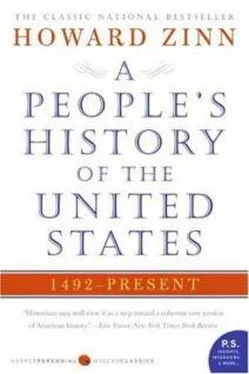Howard Zinn - A People
Здесь есть возможность читать онлайн «Howard Zinn - A People» весь текст электронной книги совершенно бесплатно (целиком полную версию без сокращений). В некоторых случаях можно слушать аудио, скачать через торрент в формате fb2 и присутствует краткое содержание. Издательство: Harper-Collins, Жанр: Фэнтези, на английском языке. Описание произведения, (предисловие) а так же отзывы посетителей доступны на портале библиотеки ЛибКат.
- Название:A People
- Автор:
- Издательство:Harper-Collins
- Жанр:
- Год:неизвестен
- ISBN:нет данных
- Рейтинг книги:4 / 5. Голосов: 1
-
Избранное:Добавить в избранное
- Отзывы:
-
Ваша оценка:
- 80
- 1
- 2
- 3
- 4
- 5
A People: краткое содержание, описание и аннотация
Предлагаем к чтению аннотацию, описание, краткое содержание или предисловие (зависит от того, что написал сам автор книги «A People»). Если вы не нашли необходимую информацию о книге — напишите в комментариях, мы постараемся отыскать её.
A People — читать онлайн бесплатно полную книгу (весь текст) целиком
Ниже представлен текст книги, разбитый по страницам. Система сохранения места последней прочитанной страницы, позволяет с удобством читать онлайн бесплатно книгу «A People», без необходимости каждый раз заново искать на чём Вы остановились. Поставьте закладку, и сможете в любой момент перейти на страницу, на которой закончили чтение.
Интервал:
Закладка:
The United States, however, succeeded in one of its aims, to reestablish its strong influence over Panama. The Times reported: "The President [of Panama] and his key aides and the American Ambassador, Deane Hinton, have breakfast together once a week in a meeting that many Panamanians view as the place where important decisions are taken."
Liberal Democrats (John Kerry and Ted Kennedy of Massachusetts, and many others) declared their support of the military action. The Democrats were being true to their historic role as supporters of military intervention, anxious to show that foreign policy was bipartisan. They seemed determined to show they were as tough (or as ruthless) as the Republicans.
But the Panama operation was on too small a scale to accomplish what both the Reagan and Bush administrations badly wanted: to overcome the American public's abhorrence, since Vietnam, of foreign military interventions.
Two years later, the Gulf War against Iraq presented such an opportunity. Iraq, under the brutal dictatorship of Saddam Hussein, had taken over its small but oil-rich neighbor, Kuwait, in August 1990.
George Bush needed something at this point to boost his popularity among American voters. The Washington Post (October 16, 1990) had a front-page story headline: "Poll Shows Plunge in Public Confidence: Bush's Rating Plummets." The Post reported (October 28): "Some observers in his own party worry that the president will be forced to initiate combat to prevent further erosion of his support at home."
On October 30, a secret decision was made for war against Iraq. The United Nations had responded to the invasion of Kuwait by establishing sanctions against Iraq. Witness after witness testified before Congressional committees in the fall of 1990 that the sanctions were having an effect and should continue. Secret CIA testimony to the Senate affirmed that Iraq 's imports and exports had been reduced by more than 90 percent because of the sanctions.
But after the November elections brought gains for the Democrats in Congress, Bush doubled American military forces in the Gulf, to 500,000, creating what was now clearly an offensive force rather than a defensive one. According to Elizabeth Drew, a writer for the New Yorker , Bush's aide John Sununu "was telling people that a short successful war would be pure political gold for the President and would guarantee his re-election."
Historian Jon Wiener, analyzing the domestic context of the war decision shortly afterward, wrote that "Bush abandoned sanctions and chose war because his time frame was a political one set by the approaching 1992 presidential elections."
That and the long-time U.S. wish to have a decisive voice in the control of Middle East oil resources were the crucial elements in the decision to go to war against Iraq. Shortly after the war, as representatives of the thirteen oil-producing nations were about to gather in Geneva, the business correspondent of the New York Times wrote: "By virtue of its military victory the United States is likely to have more influence in the Organization of Petroleum Exporting Countries than any industrial nation has ever exercised."
But those motives were not presented to the American public. It was told that the United States wanted to liberate Kuwait from Iraqi control. The major media dwelled on this as a reason for war, without noting that other countries had been invaded without the United States showing such concern (East Timor by Indonesia, Iran by Iraq, Lebanon by Israel, Mozambique by South Africa; to say nothing of countries invaded by the United States itself-Grenada, Panama).
The justification for war that seemed most compelling was that Iraq was on its way to building a nuclear bomb, but the evidence for this was very weak. Before the crisis over Kuwait, Western intelligence sources had estimated it would take Iraq three to ten years to build a nuclear weapon. Even if Iraq could build a bomb in a year or two, which was the most pessimistic estimate, it had no delivery system to send it anywhere. Besides, Israel already had nuclear weapons. And the United States had perhaps 30,000 of them. The Bush administration was trying hard to develop a paranoia in the nation about an Iraqi bomb which did not yet exist.
Bush seemed determined to go to war. There had been several chances to negotiate an Iraqi withdrawal from Kuwait right after the invasion, including an Iraqi proposal reported on August 29 by Newsday correspondent Knut Royce. But there was no response from the United States. When Secretary of State James Baker went to Geneva to meet with Iraqi foreign minister Tariq Aziz, the instruction from Bush was "no negotiations."
Despite months of exhortation from Washington about the dangers of Saddam Hussein, surveys showed that less than half of the public favored military action.
In January 1991, Bush, apparently feeling the need for support, asked Congress to give him the authority to make war. This was not a declaration of war, as called for by the Constitution; but since Korea and Vietnam, that provision of the Constitution seemed dead, and even the "strict constructionists" on the Supreme Court who prided themselves on taking the words of the Constitution literally and seriously would not intervene.
The debate in Congress was lively. (At one point, a Senate speech was interrupted by protesters in the balcony shouting "No blood for oil!" The protesters were hustled out by guards.) It is likely that Bush was sure of having enough votes, or he would have launched the invasion without Congressional approval; after all, the precedent for ignoring Congress and the Constitution had been set in Korea, Vietnam, Grenada, and Panama.
The Senate voted for military action by only a few votes. The House supported the resolution by a larger majority. However, once Bush ordered the attack on Iraq, both houses, with just a few dissents, Democrats as well as Republicans, voted to "support the war and support the troops."
It was in mid-January 1991, after Saddam Hussein defied an ultimatum to leave Kuwait, that the U.S. launched its air war against Iraq. It was given the name Desert Storm. The government and the media had conjured up a picture of a formidable military power, but Iraq was far from that. The U.S. Air Force had total control of the air, and could bomb at will.
Not only that, U.S. officials had virtual total control of the airwaves. The American public was overwhelmed with television photos of "smart bombs" and confident statements that laser bombs were being guided with perfect precision to military targets. The major networks presented all of these claims without question or criticism.
This confidence in "smart bombs" sparing civilians may have contributed to a shift in public opinion, from being equally divided on going to war, to perhaps 85 percent support for the invasion. Perhaps more important in winning over public support was that once American military were engaged, it seemed to many people who had previously opposed military action that to criticize it now meant betraying the troops who were there. All over the nation yellow ribbons were displayed as a symbol of support for the forces in Iraq.
In fact, the public was being deceived about how «smart» the bombs being dropped on Iraqi towns were. After talking with former intelligence and Air Force officers, a correspondent for the Boston Globe reported that perhaps 40 percent of the laser-guided bombs dropped in Operation Desert Storm missed their targets.
John Lehman, Secretary of the Navy under President Reagan, estimated there had been thousands of civilian casualties. The Pentagon officially had no figure on this. A senior Pentagon official told the Globe , "To tell you the truth, we're not really focusing on this question."
Читать дальшеИнтервал:
Закладка:
Похожие книги на «A People»
Представляем Вашему вниманию похожие книги на «A People» списком для выбора. Мы отобрали схожую по названию и смыслу литературу в надежде предоставить читателям больше вариантов отыскать новые, интересные, ещё непрочитанные произведения.
Обсуждение, отзывы о книге «A People» и просто собственные мнения читателей. Оставьте ваши комментарии, напишите, что Вы думаете о произведении, его смысле или главных героях. Укажите что конкретно понравилось, а что нет, и почему Вы так считаете.












